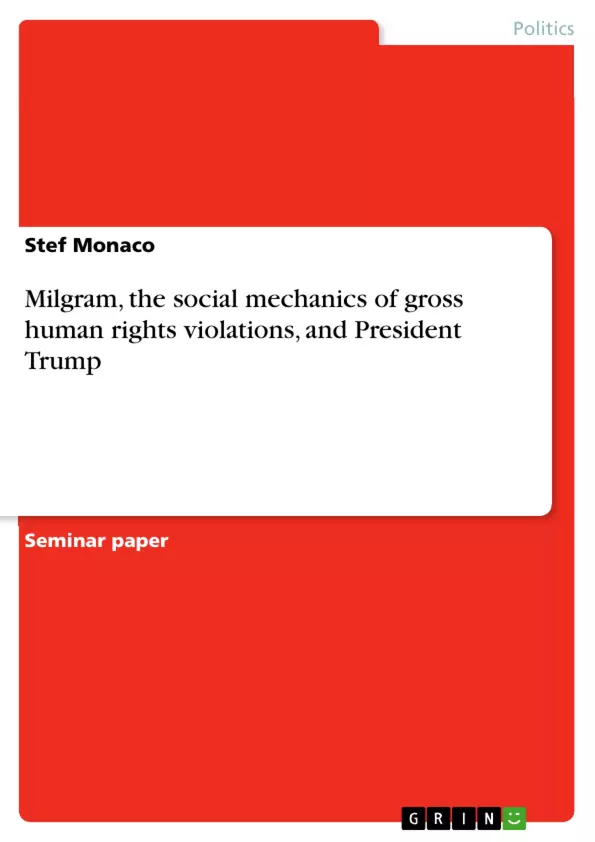Milgram’s work in his 1974 book Obedience to Authority provides a useful analytical tool for understanding the social mechanics that lead to gross violations of human rights. A socially constructed locus of authority supported by an institutional machinery, the socialisation of a worldview based on an us versus them philosophy that supplies ideological legitimacy to the authority’s commands, and the fragmentation of acts into narrower tasks in hierarchically structured bureaucracies which profit from most people’s tendency to obey authority. Based on available reports and key decisions made to date, it may be said that the social mechanics described by Milgram are in operation in the U.S. and that President Trump is both the product and the source of a political and social environment that is making it much easier for people to engage in behaviour that constitutes human rights violations - such as discriminatory acts, and that unless there is strong and consistent dissent, it is possible that the situation will continue to deteriorate.
Inhaltsverzeichnis (Table of Contents)
- Introduction
- The social mechanics of gross human rights violations or how to get away with murder
- Control the way in which a man interprets his world, and you have gone a long way toward controlling his behaviour
- Ideological justification is vital in obtaining willing obedience, for it permits the person to see his behaviour as serving a desirable end. Only when viewed in this light, is compliance easily exacted
- [O]rdinary people, simply doing their jobs, and without any particular hostility on their part, can become agents in a terrible destructive process
Zielsetzung und Themenschwerpunkte (Objectives and Key Themes)
This paper aims to analyze the social mechanics that lead to gross human rights violations, drawing on Milgram's work in his 1974 book "Obedience to Authority". The paper examines how these mechanics are in operation in the U.S. under President Trump, highlighting the role of authority, ideology, and social fragmentation.
- The social mechanics of gross human rights violations as outlined by Milgram.
- The role of authority and its institutionalization in enabling violations.
- The importance of ideological legitimacy in justifying authority's commands.
- The impact of social fragmentation and the "us vs. them" mentality in promoting obedience.
- The use of propaganda and "alternative facts" to shape public perception.
Zusammenfassung der Kapitel (Chapter Summaries)
- Introduction: Introduces the topic of gross human rights violations and how they are facilitated by social mechanics. It emphasizes the relevance of Milgram's work in understanding these dynamics.
- The social mechanics of gross human rights violations or how to get away with murder: Explores how the concept of authority is transferred from the people to their elected representatives, leading to a shift in power dynamics. It highlights the impersonal nature of authority in contemporary society and its potential for abuse.
- Control the way in which a man interprets his world, and you have gone a long way toward controlling his behaviour: Discusses the importance of ideological legitimacy in anchoring authority and justifying its actions. It emphasizes the role of propaganda, "alternative facts", and the manipulation of group identity in shaping public perception and ensuring obedience.
- Ideological justification is vital in obtaining willing obedience, for it permits the person to see his behaviour as serving a desirable end. Only when viewed in this light, is compliance easily exacted: Analyzes how the fragmentation of tasks within hierarchical bureaucracies allows individuals to participate in human rights violations without fully recognizing or accepting responsibility for their actions.
- [O]rdinary people, simply doing their jobs, and without any particular hostility on their part, can become agents in a terrible destructive process: Examines the factors that facilitate obedience to authority, including the perception of legitimacy, the shift from autonomy to subservience, the fragmentation of acts, and the psychological distance from the consequences of actions. It highlights how these dynamics can contribute to human rights violations.
Schlüsselwörter (Keywords)
This paper focuses on the social mechanics of gross human rights violations, drawing on Milgram's work on obedience to authority, President Trump's leadership style, the role of ideology and propaganda, and the impact of social fragmentation and the "us vs. them" mentality. Key concepts include authority, legitimacy, obedience, fragmentation, ideological justification, propaganda, "alternative facts", and group identity.
- Quote paper
- Stef Monaco (Author), 2017, Milgram, the social mechanics of gross human rights violations, and President Trump, Munich, GRIN Verlag, https://www.grin.com/document/367236



